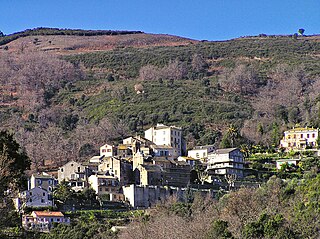
Corsican is a Romance language constituted by the continuum of the Italo-Dalmatian dialects spoken on the Mediterranean island of Corsica (France) and on the northern end of the island of Sardinia (Italy). Corsican is related to the Tuscan varieties from the Italian peninsula, and therefore also to the Florentine-based standard Italian.

Corte is a commune in the Haute-Corse department, on the island of Corsica, France.

Filippo Antonio Pasquale de' Paoli was a Corsican patriot, statesman, and military leader who was at the forefront of resistance movements against the Genoese and later French rule over the island. He became the President of the Executive Council of the General Diet of the People of Corsica and wrote the Constitution of the state.

The National Liberation Front of Corsica is a militant group that advocates an independent state on the island of Corsica, separate from France. The organisation was primarily present in Corsica and less so on the French mainland. A Conculta Naziunalista was often considered to be the political wing of the organisation.
Dio vi salvi Regina is a folk song in the culture of Corsica. The local nationalists also consider it the de facto "national anthem" of Corsica. It is customary to sing it at the end of any concert of Corsican folk music.

The Corsican Assembly is the unicameral legislative body of the territorial collectivity of Corsica. It has its seat at the Grand Hôtel d'Ajaccio et Continental, in the Corsican capital of Ajaccio. After the 2017 territorial elections, the assembly was expanded from 51 to 63 seats, with the executive council expanding from 9 to 11 members.

The Corsicans are a Romance ethnic group. They are native to Corsica, a Mediterranean island and a territorial collectivity of France.

Lucciana is a French commune in the department of Upper Corsica, collectivity and island of Corsica.

Corsica is an island in the Mediterranean Sea and one of the 18 regions of France. It is the fourth-largest island in the Mediterranean and lies southeast of the French mainland, west of the Italian Peninsula and immediately north of the Italian island of Sardinia, which is the land mass nearest to it. A single chain of mountains makes up two-thirds of the island. As of January 2023, it had a population of 351,255.

The Party of the Corsican Nation is a Corsican nationalist and autonomist political party on the French island of Corsica. It was founded in Corte in 2002 by members of three nationalist parties, Union of the Corsican People (UPC), A Scelta Nova and A Mossa Naziunale.

Italian irredentism in Corsica was a cultural and historical movement promoted by Italians and by people from Corsica who identified themselves as part of Italy rather than France, and promoted the Italian annexation of the island.

In November 1755, Pasquale Paoli proclaimed Corsica a sovereign nation, the Corsican Republic, independent from the Republic of Genoa. He created the Corsican Constitution, which was the first constitution written in Italian under Enlightenment principles, including female suffrage, later revoked by the French when they took over the island in 1769. The republic created an administration and justice system, and founded an army.

The flag of Corsica was adopted by General of the Nation Pasquale Paoli in 1755 and was based on a traditional flag used previously. It portrays a Moor's head in black wearing a white bandana above his eyes on a white background. Previously, the bandana covered his eyes; Paoli wanted the bandana moved to above the eyes to symbolise the liberation of the Corsican people from the Genoese.

The Anglo-Corsican Kingdom, also known as the Kingdom of Corsica, was a client state of the Kingdom of Great Britain that existed on the island of Corsica between 1794 and 1796, during the French Revolutionary Wars.

Corsican nationalism is a nationalist movement in Corsica that advocates more autonomy for the island, if not outright independence from France.
The Corsican Mafia is a set of criminal groups originating from Corsica. The mafia is closely tied to both the French underworld and the Italian Mafia. The Corsican mafia is an influential organized crime structure operating in France, Russia, and many African and Latin American countries.

The French conquest of Corsica was a successful expedition by French forces of the Kingdom of France under Comte de Vaux, against Corsican forces under Pasquale Paoli of the Corsican Republic. The expedition was launched in May 1768, in the aftermath of the Seven Years' War. A French expeditionary force was landed on the island of Corsica, then ruled by the Corsican Republic. Marching inland to overcome any Corsican opposition, the French force initially suffered an unexpected defeat at the Battle of Borgo. But a new commander, the Comte de Vaux, was appointed to lead the expedition, and decisively defeated the Corsican army at the Battle of Ponte Novu in 1769, effectively bringing an end to Corsican resistance.

The cuisine of Corsica is the traditional cuisine of the island of Corsica. It is mainly based on the products of the island, and due to historical and geographical reasons, has much in common with Italian cuisine, and marginally with those of Nice and Provence.

The 2015 Corsican protests were a series of marches by several hundred Corsican nationalists that began on 25 December, in Ajaccio, capital of Corsica. During the initial demonstrations, a Muslim prayer hall was burned down and Qur'ans were set alight. Further protests were organised after the initial march despite a government ban on protests until 4 January 2016. The protesters claimed to be acting in revenge for an incident that occurred the day prior when firefighters and police were assaulted in the neighbourhood of Les Jardins de l'Empereur; however, outside observers labeled the ensuing riots as anti-Arab and anti-Muslim. The Corsican nationalist politicians have claimed their view does not legitimise xenophobia, blaming the protest on French nationalism instead. Scholarly opinions on this claim are divided.














